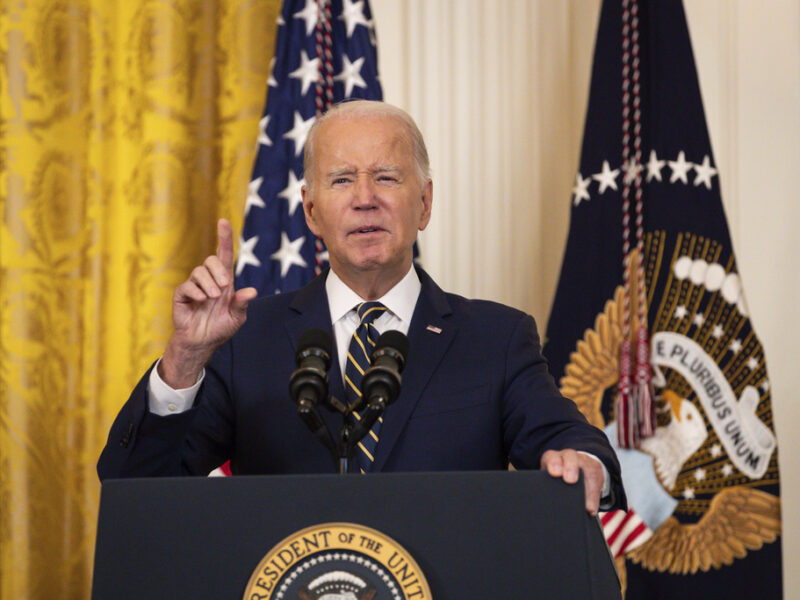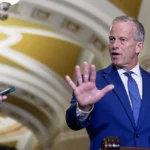New Federal Rules Would Bolster Insurance Plans’ Mental Health Coverage
Mental health issues remain key concern throughout Wyoming
- Published In: Politics
- Last Updated: Jul 26, 2023

President Joe Biden on Tuesday announced new federal rules designed to ease burdens Americans face accessing mental health treatment services. (Photo by Allison Bailey/NurPhoto via AP)
By Jacob Gardenswartz
Special to the Wyoming Truth
WASHINGTON — President Joe Biden on Tuesday announced a slate of new proposals intended to improve health insurance plans’ coverage of mental health treatments, as concerns about Americans’ mental well-being persist in the wake of the COVID-19 pandemic.
Nearly one-in-four Americans are living with a mental, behavioral or emotional disorder, according to figures from the Substance Abuse and Mental Health Services Administration (NAMHSA), the government agency overseeing behavioral health matters. In Wyoming, over a quarter of residents were in that category in 2021, the most recent year for which such data exists, putting the state near the very top of the list of those most impacted by mental health concerns.
In remarks from the White House Tuesday, Biden stressed the need for continued action to address this “crisis,” pledging that his administration would do everything it could to help Americans get the care they need.
“One of the things that the pandemic demonstrated is there’s a need for a lot more help: over a million people dead from COVID, that’s estimated to mean 8 million people left behind,” Biden said. “The impact on people’s lives is profound.”
The proposed rules, which must still go through the Federal Register’s notice-and-comment period before taking effect, would require health insurers to study how their plans treat mental health services and ensure such policies provide a similar coverage to physical health treatments. Though the Mental Health Parity and Addiction Equity Act (MHPAEA), passed by Congress in 2008, mandates that insurers provide equal levels of coverage for mental and physical health, federal regulators and patient advocates have claimed insurers often failed to comply.
Indeed, a report released Tuesday from officials in the Departments of Labor, Health and Human Services and Treasury showed that between February 2021 and July 2022, federal regulators took steps to investigate over 500 “non-quantitative treatment limitations” (NQTLs), the formal term for actions taken by insurance companies to limit policyholders’ access to care. The officials noted some insurers continued instituting NQTLs despite repeated investigations and enforcement actions.
Once finalized, the new rules would prohibit insurers from imposing such barriers to accessing mental health care — instituting prior authorization requirements or narrowing which network of doctors mental health patients could utilize, for example. They would also close a so-called “loophole” in the original law exempting health plans for state and local government employees from such standards, ensuring that everyone with healthcare coverage has access to needed treatments.
“Just like when you break a bone or you have a heart attack, when you’re having a mental health crisis, you should be able to get help,” Biden said to applause.
Suicide crisis in the Equality State
The mental health crisis raging throughout the country has hit Wyoming especially hard. In 2021, the state had the highest suicide rate in the nation, though the number of suicides fell by over 20% the following year according to state-level data. (Federal suicide figures for 2022 have yet to be released).
Wyoming’s mental health problems are similar to those experienced in other rural, Western states. Though the pandemic impacted everyone, many Wyomingites living in rural areas or without access to high-speed internet were made to feel especially lonely, and the state’s macho, cowboy culture meant speaking out about such difficulties was especially hard.
Moreover, almost every county in the state has been designated a mental health professional shortage area, so finding nearby treatment services can be all but impossible.
Gov. Mark Gordon has made addressing mental health a cornerstone of his agenda; he’s helped expand the 988 emergency hotline and pushed for more stable funding, hosted mental health summits bringing stakeholders together to develop innovative solutions and just this year launched a task-force aimed at recruiting more healthcare professionals — among them therapists and mental health counselors — to the state.
Still, even an issue as widespread as mental health care has drawn political battles. During remarks at a summit in April, Gordon lashed out at some conservative state lawmakers who blocked efforts to devote more funding to the statewide suicide hotline.
“When somebody says phone calls don’t make a difference, tell them they’re full of beans,” Gordon said. “We all need to care for one another. I know this sounds utopian, but that is the state I grew up in. We need to rediscover that.”
Reached on Tuesday, spokespeople for Gordon and the Wyoming Department of Health both declined to comment on the new federal proposals.
“While increasing access to mental health care is an objective of Governor Gordon’s, it would be premature for him to offer a comment on these proposed rules,” a Gordon spokesman told the Wyoming Truth. “The state will need time to review the language and potential impacts of the President’s proposal.”
National mental health advocacy groups, meanwhile, were quick to celebrate the new rules. Jesse Ehrenfeld, president of the American Medical Association, said in a statement his group “strongly supports” the move, adding that he “hope[s] the Labor Department, as well as states, will increase efforts to regularly review plans to ensure they are in compliance with MHPAEA — and hold insurers accountable if they are not.”
And Biden concluded his White House remarks with a call for all Americans to recognize the importance of mental wellness.
“Whether you’re in a red state or blue state, it doesn’t matter. Mental health care can be life changing and even life-saving for all those brave enough and strong enough to seek help,” Biden said.
“We have to do better. Together, I know we will.”













